Edition: 23 October to 3 November 2023
PARTNERSHIPS
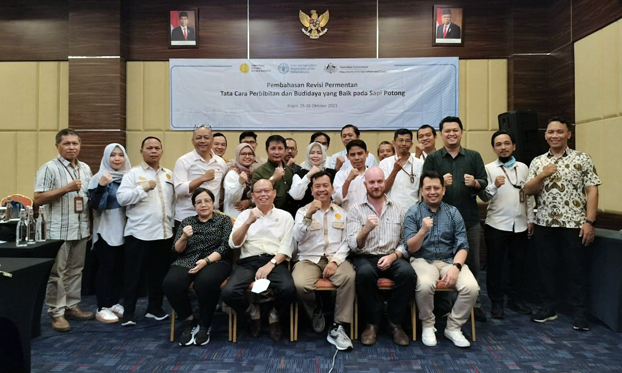 ©fao/Dian Tarigan | INDONESIA Revision meeting for the ministerial regulation of good breeding practices and good farming practices for beef cattle FAO ECTAD Indonesia, in collaboration with the Directorate General of Livestock and Animal Health Services (DGLAHS), with support from the Australian Department of Foreign Affairs and Trade (DFAT), hosted a meeting to review and update Good Farming Practices (GFP) and Good Breeding Practices (GBP) for ruminants in Bogor on 25-26 October 2023. The representatives from the relevant directorate and substantial groups under DGLAHS, the National Research and Innovation Agency, the legal bureau, academia from the University of Padjajaran, and the Association of Indonesian Animal Husbandry attended the meeting. The meeting mainly debated merging two past ministerial regulations on guidelines concerning GFP and ministerial regulations on guidelines concerning GBP for beef cattle. |
.jpg?sfvrsn=54088dce_1) ©fao/Saskia Soedarjo | INDONESIA Work plan consultation meeting for Global Health Security Programme (GHSP)
From 2 until 3 November 2023, FAO ECTAD Indonesia and USAID Indonesia kicked off the new cooperation on the Global Health Security Programme (GHSP) year 2023-2027 with the Directorate for Disease Control and Management of the Indonesian Coordinating Ministry for Human Development and Cultural Affairs (CMHDCA) through a consultation meeting to determine the work plan. The Secretary of the CMHDCA's Minister opened the meeting and expressed CMHDCA's commitment and appreciation for the new project to strengthen the country's health security by preventing and controlling zoonotic diseases and emerging infectious diseases. He anticipated the collaboration to serve as a platform for knowledge transfer, enhancing the CMHDCA's capacity to implement and manage similar projects in the future. |
| Learn more about our partnerships here. | |
ANTIMICROBIAL RESISTANCE (AMR)
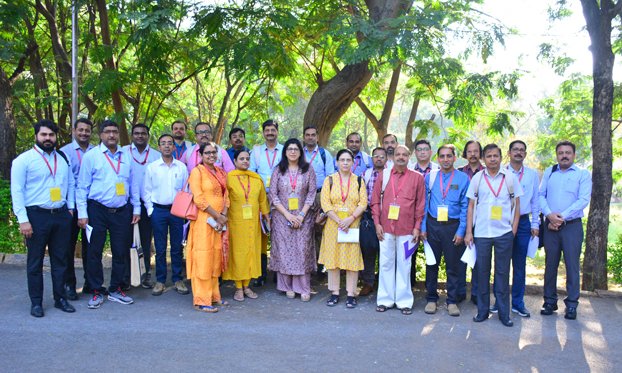 ©FAO ECTAD INDIA | INDIA Training organized on an FAO-developed and validated protocol for antimicrobial usage at the farm level The Food and Agriculture Organization of the United Nations (FAO), in collaboration with the Indian Council of Agriculture Research (ICAR) – Directorate of Poultry Research (DPR) organized a two-day training at the National Institute of Plant Health Management (NIPHM) on 26-27 October in Hyderabad. The training focused on using an FAO-developed and validated protocol for the estimation of antimicrobial usage (AMU) at the farm level. The two-day training was attended by 25 dedicated scientists, including Principal Investigators and Co-Principal Investigators of the Indian Network for Fisheries and Animal Antimicrobial Resistance (INFAAR), and officers from the Department of Animal Husbandry and Dairying (DAHD), Government of India. |
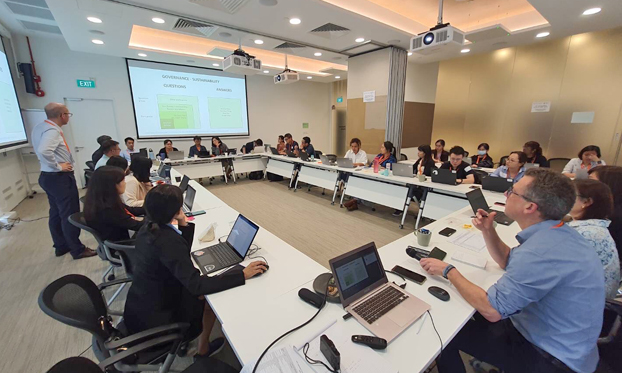 ©FAO/Mary Joy Gordoncillo | INDONESIA AND ASIA AND THE PACIFIC National AMR Surveillance System Assessment for the Indonesian Animal Health Sector using FAO-ATLASS FAO ECTAD Indonesia together with FAO Regional Office of Asia and the Pacific (RAP) and the Indonesian Ministry of Agriculture (MoA) conducted a three-day National antimicrobial resistance (AMR) Surveillance System Assessment for the Indonesian Animal Health Sector using the FAO-Assessment Tool for Lab & AMR Surveillance Systems (FAO-ATLASS) with the support of USAID from 25 to 27 October 2023. Assessors from FAO RAP led the assessment and filled in the FAO-ATLASS questionnaire to identify gaps in the National AMR surveillance system in the animal health sector together with participants from MoA, Ministry of Health, Ministry of Environment and Forestry, Ministry of Fisheries and Marine Affairs, Disease Investigation Center Wates, National Research and Innovation Agency and other related stakeholders. According to the assessment results, the AMR surveillance system in animal health has advanced from level 1 (limited) to level 2 (moderate). |
| Learn more about our AMR here. | |
AFRICAN SWINE FEVER (ASF)
 ©FAO/Carla Baker | ASIA AND THE PACIFIC FAO joins policy roundtable and workshop on transboundary wildlife diseases
FAO participated in the roundtable and workshop on transboundary wildlife diseases organized by the Republic of Korea (ROK) Ministry of Environment's National Institute of Wildlife Disease Control and Prevention (NWIDC) in October. The roundtable and workshops focused on One Health strategies and policies to manage wildlife diseases such as avian influenza and ASF. FAO shared its initiatives to support the management of wildlife diseases, with African swine fever (ASF) as an example. Some of the key highlights of FAO's contribution to the workshop included the results of ASF studies conducted in collaboration with the Thailand Mahidol University. This included studies on free-ranging wild boar habitat and distribution; wild boar value-chain; and, wild boar-human interaction. |
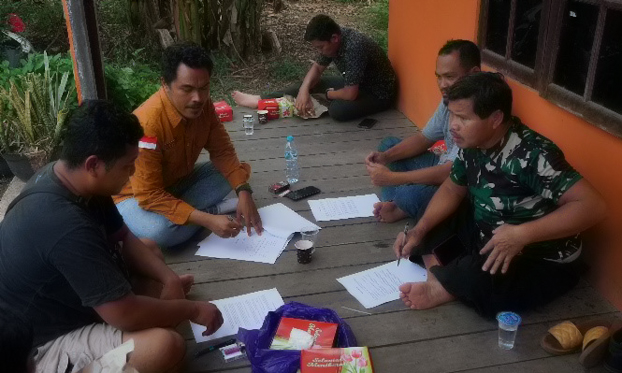 ©FAO/Alia Dwirahmani | INDONESIA Implementation of the CABI programme in West Kalimantan province
FAO ECTAD Indonesia, together with the Directorate of Animal Health (DAH) of the Ministry of Agriculture, visited West Kalimantan to collect preliminary data for the implementation of the Community African Swine Fever Biosecurity Intervention (CABI) programme in targeted piloting areas in Pontianak City and Landak District, with support from the Republic of Korea Ministry of Agriculture, Food and Rural Affairs. Between 24 and 27 October 2023, representatives from FAO ECTAD Indonesia and DAH worked together with Disease Investigation Center (DIC) Banjar Baru, West Kalimantan Plantation and Livestock Provincial officers, Pontianak City animal health officers, and Landak District animal health officers to interview pig farmers and fill out the CABI questionnaire for identifying needs and required intervention. |
| Learn more about our work on ASF here. | |
ONE HEALTH
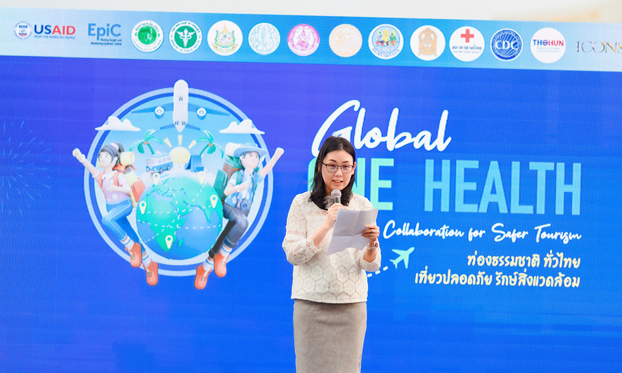 ©One Health Coordinating Office, Thailand | ASIA AND THE PACIFIC Global One Health Day celebrated
Celebrating the Global One Health Day on 3 November 2023, FAO participated in the One Health event in Thailand. The event theme was “One Health Collaboration for Safer Tourism” and was held at a shopping complex to attract more participation. FAO highlighted the collaboration with Thailand to implement effective and collaborative One Health strategies, along with other international organizations. Panel discussions on food safety and travel medicine as well as exhibitions and activities such as traditional massage and a lucky draw delivered a successful and interesting event to the visitors. |
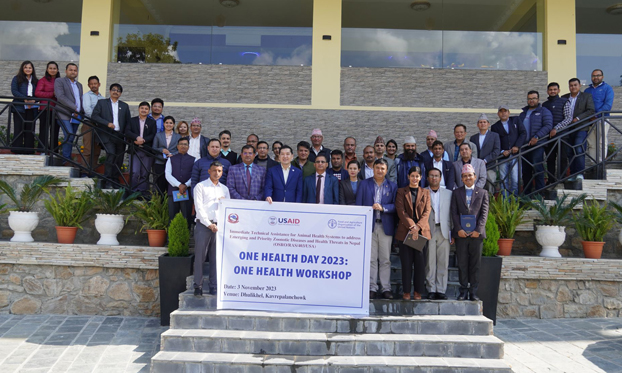 ©FAO/Surendra karki | NEPAL One Health Workshop conducted to commemorate One Health Day 2023
FAO Nepal through the USAID-funded Global Health Security (GHS) program supported the Department of Livestock Services (DLS) and One Health partners to come together to discuss different spectrums of One Health to commemorate One Health Day 2023 on 3-4 November. More than 40 participants working in animal health, public health, food, environment, wildlife, agriculture, World Health Organization and the Fleming Fund participated in the program in the gracious presence of the Secretary of the Ministry of Agriculture and Livestock Development, Additional Secretary of the Ministry of Health and Population, Director Generals from the Department of Health and DLS, and FAO Representative for Nepal. Technical presentations were made from the human health, animal health, food, and wildlife sectors on the areas of work where they have applied the One Health approach. |
| Learn more about our work on One health here. | |
CAPACITY DEVELOPMENT
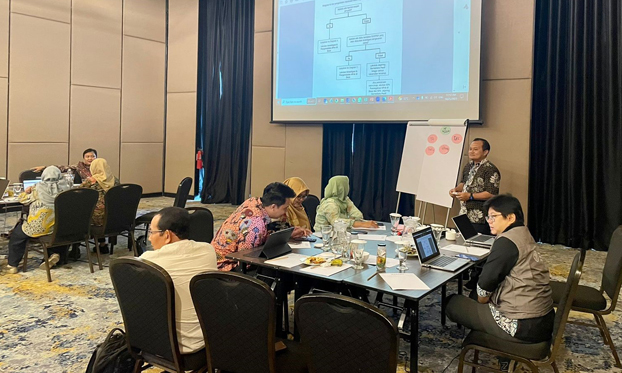 ©FAO/Saskia Soedarjo | INDONESIA Developing a strategy to improve field officers’ capacity for FMD-LSD detection and control In order to strengthen the control programme for foot-and-mouth disease (FMD) and lumpy skin disease (LSD), the Indonesian Ministry of Agriculture (MoA) and FAO ECTAD Indonesia met from 24 to 25 October 2023 to develop a strategy to increase the capacity of field officers (frontliners) in detecting and responding to FMD and LSD. Experts from Bogor Agricultural Institute (IPB) and Hasanuddin University shared their lessons learned from the previous FMD-LSD control efforts through participatory disease surveillance (PDS) and community animal health workers (CAHW) mechanisms in Indonesia with all participants. As a follow-up, all participants agreed to finalize the training curriculum for field officers in detecting and responding to FMD and LSD, as well as compiling training modules, conducting training of trainers (ToT) training for field officers in detection and response to FMD and LSD, both offline and online through the MoA's Directorate of Animal Health learning management system (LMS), and providing assistance to field officers in FMD and LSD detection and response. |
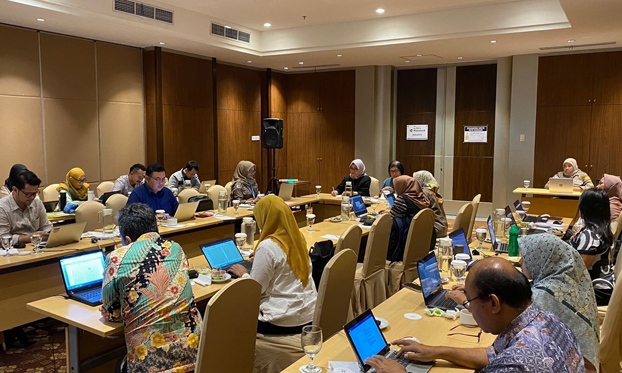 ©Indonesia Ministry of Agriculture | INDONESIA Meeting on developing national guidelines for biosecurity on ruminant farms On 30-31 October 2023, FAO ECTAD Indonesia and the Directorate General of Livestock and Animal Health Services (DGLAHS), with support from the Australian Department of Foreign Affairs and Trade (DFAT), held an initial meeting on the development of national guidelines for biosecurity on ruminant farms in Bogor. The expert commission, legal bureau, Academia from the School of Veterinary Medicine and Biomedical Science, and Faculty of Animal Husbandry of Bogor Agricultural Institute, Indonesian Cattle Veterinary Association, and private sectors of PT Great Giant Livestock and PT Greenfield Indonesia contributed to developing the outline based on discussion and input from all participants. Lesson learned from implementing biosecurity practices in vertical dairy farms and vertical beef cattle farms, as well as Infection Prevention and Control (IPC) and biosecurity assessment, were also shared and discussed in the meeting. Melissa McLaws from FAO Animal Production and Health Division (NSAH) also presented on the Progressive Management Pathway for Terrestrial Animal Biosecurity (PMP-TAB), which will be discussed in more depth when she visits Indonesia. |
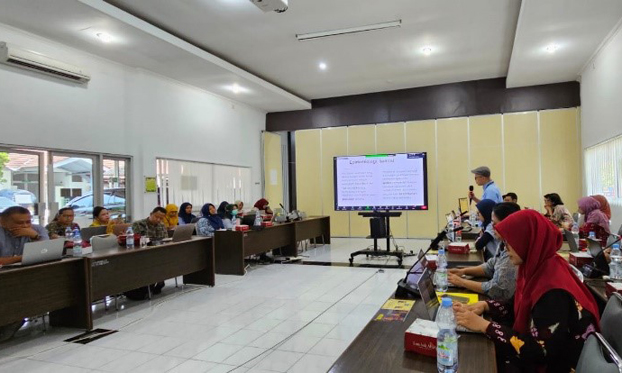 ©DIC Wates | INDONESIA Strengthening DIC Wates capacity in surveillance through in-house training in basic disease mapping and data analysis FAO ECTAD Indonesia and Directorate General of Livestock and Animal Health Services (DGLAHS) conducted an in-house training with funding from USAID from 31 October until 02 November 2023 to increase Disease Investigation Center (DIC) Wates’ capacity in surveillance data analysis, especially on spatial analysis. This training aimed to strengthen DIC Wates’ capacity in animal disease surveillance of target priority zoonoses and Emerging Infectious Diseases (EID) through increasing technical staff skills in basic mapping/spatial analysis and technical interpretation. During the three-day training, experts from FAO ECTAD Indonesia and DGLAHS trained 33 DIC Wates technical staff to utilize spatial tool software (QGIS) to develop basic disease base maps using vector and raster data, as well as processing available surveillance data, comprising data cleaning, data wrangling, and exploratory data analysis. |
| Learn more about our work on capacity development here. | |
SURVEILLANCE
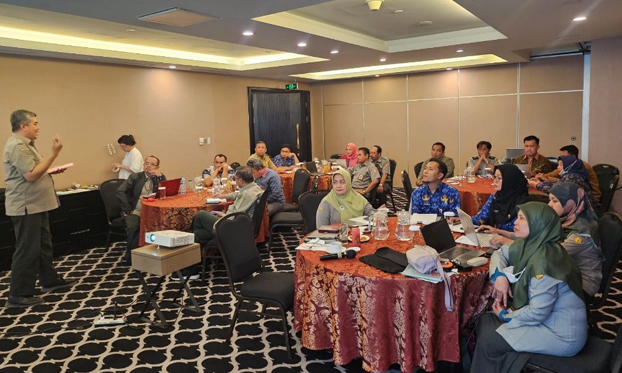 ©fao/Alia Dwirahmani | INDONESIA Improving effective disease surveillance in Indonesia |
| Learn more about our work on surveillance here. | |
